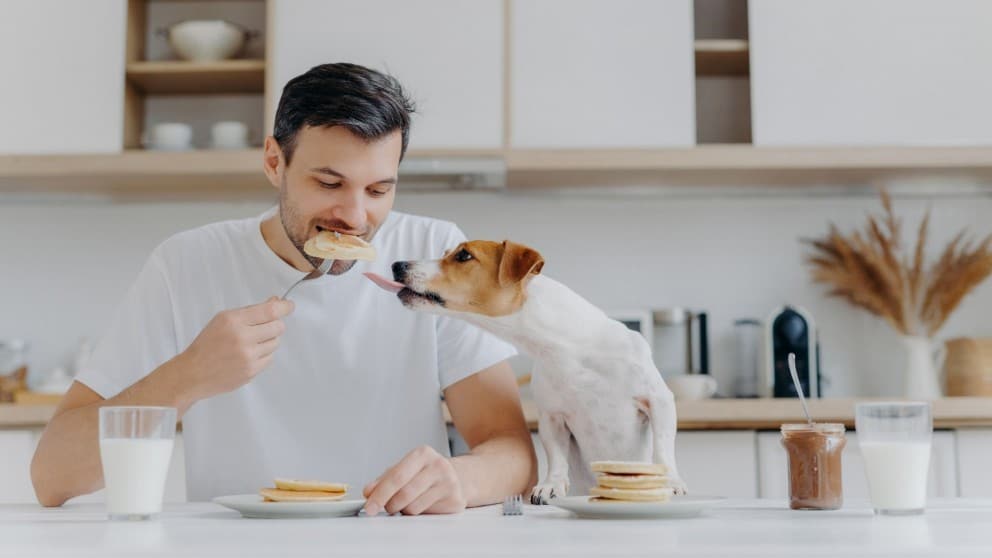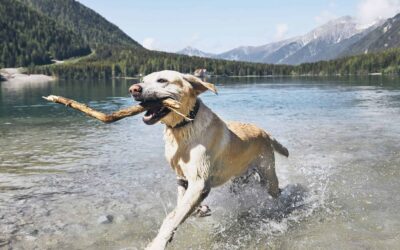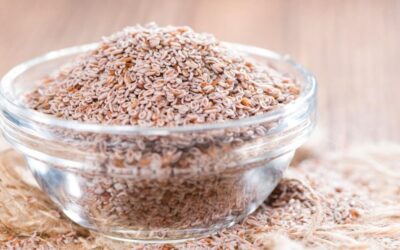A List of Foods That Your Dog Can & Can’t Eat

Part of providing the best possible care for your dog is ensuring they maintain a nutritious diet. We all know that dogs will almost always eat anything and everything they see in sight. Whether it’s food scraps that have fallen off the table or ones you’re secretly giving under the table, dogs are always on the lookout for something yummy.
But did you know there is a fairly long list of human foods that can be harmful or even toxic to your dog? From breathing issues to vomiting and even seizures, these foods can cause a lot of negative reactions. Dogs digest food differently than humans do. If you feed your dog a large amount of something on the upcoming “no-no” list, speak to your vet about the side effects.
On the bright side, many healthy food options promote great benefits for your dog, such as a shinier coat and whiter teeth. We are big advocates of dog-friendly raw diets and have seen the incredible results natural foods provide. If you do decide to make natural food options your dog’s primary food source, talk to your vet about the right nutritional plan.
What food can your dog eat?
A wide variety of foods are okay/good for dogs to eat. In fact, the benefits of these foods can be very similar to those of human benefits when it comes to nutrients, vitamins, and minerals. Please note: this isn’t an exhaustive list! Many other less common groceries are likely fine for your dog to chow down on.
If you want to be sure, you can always use a televet chat line to ask a licensed vet whether a food is safe for your dog before you try giving it to them for the first time.
- Apples
- Boneless meats
- Bananas
- Carrots (try freezing them for a healthy, fun alternative to rawhide or bone chews!)
- Blueberries
- Bread
- Celery
- Green beans
- Watermelon (remove the rind!)
- Bacon (in moderation!)
- Cheese (in moderation!)
- Eggs
- Corn
- Peanut butter (preferably all-natural!)
- Plain Yogurt
- Sweet potatoes
- Pumpkin
- Hot dogs (in moderation!)
- Fish
- Zucchini
- Butternut squash
- Peas
- Rice
- Oats (or plain oatmeal!)
- Quinoa
- Mango
- Spinach
- Cauliflower
- Chia seeds
- Flax seeds
Which food should your keep away from your dog?
While a lot of dog-safe foods are available in your kitchen as a healthy alternative to your dog’s regular snacks, there are a few sneaky foods in the kitchen that you should look out for! Not all of these foods are so toxic that they’ll endanger your dog’s life, but they may cause unpleasant symptoms and, over time, could even cause lasting damage to your dog’s health if they are consumed in large quantities.
If you think your dog has eaten any of these foods, don’t panic! The first thing you should do is call your vet or use a televet service like the one provided to all Odie customers for free. That way, you can ask a licensed vet in real time whether what your dog ate – and the amount eaten – pose a significant danger to your dog’s health. Sometimes, a vet visit will be required; other times, the vet may recommend that you monitor your dog for any symptoms at home, particularly if the food ingested wasn’t highly toxic or if only small amounts were consumed.
Chocolate
This is the most common food toxicity in dogs! Chocolate contains a compound called theobromine, which is toxic to dogs. Even small amounts of chocolate can cause vomiting, diarrhea, and restlessness. It can cause seizures, heart arrhythmia, and even death in severe cases. The darker the chocolate, the more theobromine it contains, making it more dangerous for dogs.
Xylitol
Xylitol is a sugar substitute commonly found in sugar-free gums, candies, and toothpaste and can be extremely toxic to dogs. It can cause hypoglycemia, seizures, liver damage, and even death. If you suspect your dog has ingested xylitol, seek veterinary care immediately.
Macadamia nuts
While the exact compound that causes this reaction is unknown, Macadamia nuts can cause vomiting, increased body temperature, and lethargy in dogs.
Grapes & Raisins
Grapes and raisins can cause kidney failure in dogs. The exact toxic substance in grapes and raisins is still unknown, so it is best to avoid them altogether.
Onions & Garlic
Onions and garlic in very small quantities might not cause extensive symptoms in your dog – so don’t freak out if your dog licked your plate with a couple of pieces of onion left over from dinner! But in larger quantities or with prolonged, consistent exposure, the compounds N-propyl disulfide in these foods can cause anemia in your dog by damaging its red blood cells. If you’re concerned about whether the amount of onions or garlic your dog ingested is a problem, call or chat with a televet service to see whether a vet trip is recommended.
Caffeinated drinks (soda, energy drinks, or coffee)
Dogs are more sensitive to the physiological impacts of caffeine than humans are. If your dog gets into your morning cup of joe, it might cause symptoms like raised blood pressure, cardiac arrhythmias, or jitteriness/tremors.
Cooked bones (especially chicken bones)
Cooked bones can break into shards while your dog is chewing them, which can cause problems as they travel down the digestive tract. This is especially true for bird bones, like chicken bones, which are hollow and can splinter into sharp jagged pieces. These pieces could get stuck in the intestines and require emergency surgery!
Nutmeg
Nutmeg contains a compound called Myristicin, which can impact your dog’s heart rate and blood pressure, and may even cause seizures if consumed in large quantities.
Spicy peppers
Spicy peppers can cause uncomfortable gastrointestinal symptoms in dogs, including gas and diarrhea.
Unripe tomatoes
A small amount of tomato sauce is probably fine for a dog (nothing wrong with stealing a bite of your pizza!), but unripe tomatoes contain a compound called solanine that can be toxic if ingested in large quantities.
Lemons/Lime
Citrus fruits contain citric acid, which can cause gastrointestinal distress. The more sour the fruit, the more citric acid it contains, which is why lemon and lime juice top the list of citrus your dog should stay away from (although it’s best to keep them away from citrus altogether just to be safe!)
Alcohol
Alcohol is highly toxic to dogs and can cause vomiting, diarrhea, difficulty breathing, and even coma or death. Dogs are more sensitive to alcohol than humans and can experience harmful effects even with small amounts.
Planning to get insurance for your fur babies? This article provides a guide to understanding pet insurance.



